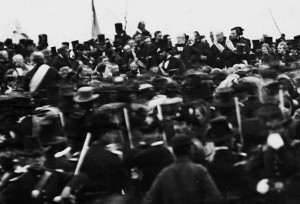
On November 19, 1863 (147 years ago today) Abraham Lincoln delivering the Gettysburg Address, one of the most profound political statements in all of human history.
“Fourscore and seven years ago our fathers brought forth on this continent a new nation, conceived in liberty and dedicated to the proposition that all men are created equal.
Now we are engaged in a great civil war testing whether that nation or any nation so conceived and so dedicated can long endure. We are met on a great battlefield of that war. We have come to dedicate a portion of that field as a final resting-place for those who here gave their lives that that nation might live. It is altogether fitting and proper that we should do this.
But in a larger sense, we cannot dedicate, we cannot consecrate, we cannot hallow this ground. The brave men, living and dead who struggled here have consecrated it far above our poor power to add or detract. The world will little note nor long remember what we say here, but it can never forget what they did here. It is for us the living rather to be dedicated here to the unfinished work which they who fought here have thus far so nobly advanced. It is rather for us to be here dedicated to the great task remaining before us-that from these honored dead we take increased devotion to that cause for which they gave the last full measure of devotion-that we here highly resolve that these dead shall not have died in vain, that this nation under God shall have a new birth of freedom, and that government of the people, by the people, for the people shall not perish from the earth.”
The Battle of Gettysburg had taken place four months earlier. 50,000 soldiers had died (23,000 Union and 28,000 Confederate). General Robert E. Lee’s defeat and retreat from Gettysburg marked the last Confederate invasion of Northern territory and the beginning of the Southern army’s decline.
Ponder again Lincoln’s words. What strikes you? Is it his reaffirmation of Jefferson’s Declaration of Independence language, “that all men are created equal?” Is it Lincoln’s somber statement of purpose: “It is for us the living rather to be dedicated here to the unfinished work?” Or is it his humble submission to sovereign God’s purpose, his Enlightenment-man conversion to orthodox Christian faith, that “this nation under God shall have a new birth of freedom?”
Ponder and respond…
